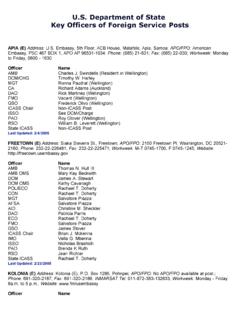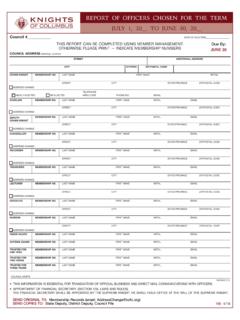Transcription of WHAT’S THE DIFFERENCE BETWEEN DIRECTORS …
1 1600 South Main St., Suite 215 | Walnut Creek, CA 94596 | Phone: | Fax: WHAT S THE DIFFERENCE BETWEEN DIRECTORS AND OFFICERS? In most homeowners associations, the same individuals usually serve as both DIRECTORS and officers. In our experience, there is often confusion about the DIFFERENCE BETWEEN DIRECTORS and officers, and many clients ask us why it is necessary to have one section of the governing documents (usually the bylaws)1 devoted to DIRECTORS while another is devoted to officers. The answer is that homeowners associations are corporations and, legally, DIRECTORS and officers are different and serve different purposes, even if the same people serve in both capacities. DIRECTORS DIRECTORS are elected by the members of the association ( homeowners) to serve on the board of DIRECTORS for the association.
2 Although all governing documents are different, the board of DIRECTORS typically is responsible for managing the real property within the development on behalf of the association. The board is also responsible for enforcing the governing documents and levying and collecting assessments sufficient to meet the association s obligations. (Civil Code section 1366.) The DIRECTORS are the corporate decision makers with regard to the vast majority of the association s business. Only the DIRECTORS are entitled vote on those association business issues that California law and/or the governing documents do not specify must be the subject of a member vote. DIRECTORS have a duty to the members who elect them; they are fiduciaries charged with acting in the best interest of the association and all its members, and are, in fact, barred from delegating that decision-making authority to anyone else.
3 Officers By contrast, officers are appointed by the board and serve at the pleasure of the board. (Corporations Code section 7213(b).) Each corporate association must have a president, a secretary and a treasurer (sometime called the chief financial officer ) (Corporations Code section 7213(a)), but the governing documents of your association may allow or require additional officers. Additionally, most governing documents give the board the authority to appoint additional officers beyond those specified, and sometimes boards appoint advisory officers. Unless the articles or bylaws provide otherwise, one person may hold multiple offices. (Corporations Code section 7213(a).) Governing documents often provide that the offices of secretary and treasurer may be held by the same person.
4 Sometimes governing documents require that certain officers already be DIRECTORS of the association; however, in theory, the DIRECTORS may be entirely different people than the officers. In practice, most DIRECTORS in homeowners associations often also serve as officers at the same time. Officers do not have voting rights, so DIRECTORS vote only in their capacities as DIRECTORS . 1 Because bylaws specify how the corporation functions, provisions regarding officers and DIRECTORS typically will be found in the bylaws. However, all governing documents are different, and you should consult with your association s attorney regarding specific questions. The duties of the officers typically are enumerated in the governing documents and most often include the duty to keep minutes, preside over meetings, and to sign contracts, loan documents and checks on behalf of the Association.
5 Frequently Asked Questions Q: Can a candidate run for board president? A: No. We have seen dissident homeowners campaign for board president, but that is a misnomer. The president is not elected by the members, but instead (like all officers) is elected/appointed by the board of DIRECTORS itself after the DIRECTORS are elected by the members. Candidates run for director positions, not officer positions. Q: Does the president vote? A: There is a popular myth in homeowners associations that the president should not be allowed to vote. Legally, each director is authorized to cast one vote (unless a director has a conflict of interest, in which case he or she should not vote at all). The president, like every other director of the association, may vote in his or her capacity as a director, irrespective of his or her office.
6 Some parliamentary procedures discourage presidents from voting unless required to break a tie, but Robert s Rules of Order (the most commonly-used form of parliamentary procedure) does not prohibit the president from voting. The president also may not cast an extra vote to break a tie. Most boards have an odd number of DIRECTORS to avoid tie decisions. In most cases, if the majority of the board does not approve a resolution, it is because there is a vacancy on the board that needs to be filled by the board or the members. Q: What authority do the members have with respect to the removal of DIRECTORS and officers? A: The same people with authority to vote for DIRECTORS and officers similarly have authority to remove them. Therefore, only the members may vote to remove a director2 because the members elected that director, while only the board itself may vote to remove an officer because only the board had authority to appoint/elect that officer .
7 If the board removes an officer , he or she remains a director (provided, of course, he or she remains qualified to serve in that capacity). Conversely, the members may not remove officers, and the board may not remove a director. However, the board can declare the office of a director vacant if the director has been declared to be of unsound mind by a final order of court, has been convicted of a felony, or fails to meet the qualifications of a director as set forth in the governing documents. (Corporations Code section 7221.) * * * * * As with most homeowners association issues, answers to specific questions often depend on the association s governing documents. If you have a question about the roles of DIRECTORS and officers in your association, we would be happy to help you.
8 2 The removal of DIRECTORS can be extremely complicated; especially if the association s governing documents permit cumulative voting. You are encouraged to contact legal counsel with specific questions about your association.








